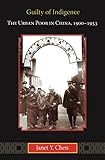Guilty of Indigence : The Urban Poor in China, 1900-1953 / Janet Y. Chen.
Material type: TextPublisher: Princeton, NJ : Princeton University Press, [2012]Copyright date: ©2012Edition: Core TextbookDescription: 1 online resource (320 p.) : 14 halftones. 1 tableContent type:
TextPublisher: Princeton, NJ : Princeton University Press, [2012]Copyright date: ©2012Edition: Core TextbookDescription: 1 online resource (320 p.) : 14 halftones. 1 tableContent type: - 9780691161952
- 9781400839988
- Poverty -- Government policy -- China -- History -- 20th century
- Poverty -- China -- History -- 20th century
- Urban poor -- China -- History -- 20th century
- HISTORY / Asia / China
- Beijing
- China
- Communists
- Japanese penology
- Nanjing Decade
- Nationalist Party
- Nationalist government
- People's Republic
- Republican-era China
- Shanghai
- World War II
- agrarian revolutionaries
- beggars
- citizenship
- coffin repositories
- custodial detention
- detention
- government custody
- government institutions
- homelessness
- incarceration
- industrial training
- labor
- nonworking poor
- poor relief
- poorhouses
- poverty policies
- productive citizens
- productivism
- reforming elites
- refugee crisis
- refugees
- relief agencies
- relief agenda
- scientific charity
- security
- shantytowns
- social dislocation
- social parasites
- socialist ideology
- sociology
- straw huts
- twentieth-century China
- urban disorder
- urban poor
- urban poverty
- vagrancy
- war victims
- work relief
- workhouse
- workhouses
- 305.569095109041 23
- HV4150.A3
- online - DeGruyter
- Issued also in print.
| Item type | Current library | Call number | URL | Status | Notes | Barcode | |
|---|---|---|---|---|---|---|---|
 eBook
eBook
|
Biblioteca "Angelicum" Pont. Univ. S.Tommaso d'Aquino Nuvola online | online - DeGruyter (Browse shelf(Opens below)) | Online access | Not for loan (Accesso limitato) | Accesso per gli utenti autorizzati / Access for authorized users | (dgr)9781400839988 |
Browsing Biblioteca "Angelicum" Pont. Univ. S.Tommaso d'Aquino shelves, Shelving location: Nuvola online Close shelf browser (Hides shelf browser)

|

|

|

|

|

|

|
||
| online - DeGruyter American Religion : Contemporary Trends / | online - DeGruyter Uprooted : How Breslau Became Wroclaw during the Century of Expulsions / | online - DeGruyter The French Way : How France Embraced and Rejected American Values and Power / | online - DeGruyter Guilty of Indigence : The Urban Poor in China, 1900-1953 / | online - DeGruyter The Makings of Indonesian Islam : Orientalism and the Narration of a Sufi Past / | online - DeGruyter The Scandal of Kabbalah : Leon Modena, Jewish Mysticism, Early Modern Venice / | online - DeGruyter Against Massacre : Humanitarian Interventions in the Ottoman Empire, 1815-1914 / |
Frontmatter -- Contents -- Acknowledgments -- A Note on Conventions -- Introduction -- Chapter 1. Between Charity and Punishment -- Chapter 2. "Parasites upon Society" -- Chapter 3. "Living Ghosts" during the Nanjing Decade -- Chapter 4. Beggars or Refugees? -- Chapter 5. Keeping Company with Ghosts -- Epilogue -- Notes -- Glossary -- Bibliography -- Index
restricted access online access with authorization star
http://purl.org/coar/access_right/c_16ec
In the early twentieth century, a time of political fragmentation and social upheaval in China, poverty became the focus of an anguished national conversation about the future of the country. Investigating the lives of the urban poor in China during this critical era, Guilty of Indigence examines the solutions implemented by a nation attempting to deal with "society's most fundamental problem." Interweaving analysis of shifting social viewpoints, the evolution of poor relief institutions, and the lived experiences of the urban poor, Janet Chen explores the development of Chinese attitudes toward urban poverty and of policies intended for its alleviation. Chen concentrates on Beijing and Shanghai, two of China's most important cities, and she considers how various interventions carried a lasting influence. The advent of the workhouse, the denigration of the nonworking poor as "social parasites," efforts to police homelessness and vagrancy--all had significant impact on the lives of people struggling to survive. Chen provides a crucially needed historical lens for understanding how beliefs about poverty intersected with shattering historical events, producing new welfare policies and institutions for the benefit of some, but to the detriment of others. Drawing on vast archival material, Guilty of Indigence deepens the historical perspective on poverty in China and reveals critical lessons about a still-pervasive social issue.Some images inside the book are unavailable due to digital copyright restrictions.
Issued also in print.
Mode of access: Internet via World Wide Web.
In English.
Description based on online resource; title from PDF title page (publisher's Web site, viewed 29. Jul 2021)


